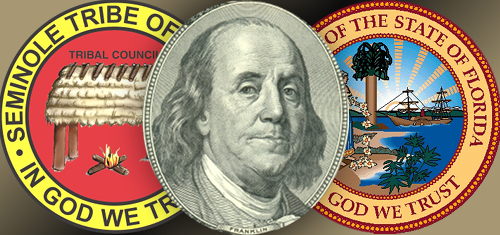 Florida Gov. Rick Scott and the state’s Seminole Tribe have reached agreement on a new 20-year gaming compact, which includes a seven-year, $3.1b revenue guarantee.
Florida Gov. Rick Scott and the state’s Seminole Tribe have reached agreement on a new 20-year gaming compact, which includes a seven-year, $3.1b revenue guarantee.
After much delay and public posturing, the parties announced late Monday that they’d reached a deal that will preserve the tribe’s right to offer blackjack and other house-banked card games at all seven of its casinos, two more than were covered under the previous compact that expired in July.
The tribe’s casinos will also have the right to offer non-card table games like roulette and craps. But the tribe can’t expand its facilities for the duration of the compact and must also loosen its grip on the state’s slots market.
Under the old compact, slots were limited to the tribe’s casinos and some pari-mutuel racetracks in Broward and Miami-Dade counties. The new deal will allow two new slots licenses: one at the Palm Beach Kennel Club, while the other would be reserved for a potential new venue in Miami-Dade. Each of the new facilities would be allowed a maximum of 750 slots and 750 ‘instant racing’ machines.
Tracks in Broward and Miami-Dade counties will have the option of adding blackjack to their gaming mix down the road “with some limitations.” But Florida also plans to contract the state’s racing industry by using some of the revenue generated by the new compact to ‘buy back’ existing gambling permits, thereby allowing struggling track operators a graceful exit.
The tribe agreed to certain caps on gaming options at its casinos, each of which will be limited to no more than 6k slot machines and 300 gaming tables. The tribe also agreed to allow the Florida Lottery to sell tickets at gas pumps.
The state wrung another concession from the tribe on the issue of online gambling. While Florida hasn’t made a serious push to follow New Jersey, Nevada and Delaware in passing intrastate online gambling legislation, the Seminoles have agreed not to object should the state choose to go down this road.
The compact will still require the approval of Florida legislators, who won’t be back at their desks until the 2016 legislative session starts on January 12. A companion document that specifies the scope of the new licenses in Miami-Dade and Palm Beach counties will also need to be approved before the deal is officially done.
Getting Florida pols to agree on gambling issues has proved to be only slightly less onerous than herding cats, but state Sen. Rob Bradley, who led the government’s side in the compact negotiations, said the new pact represented “a significant increase in revenue sharing with the tribe” and a “good fair deal for taxpayers.”
Gov. Scott wrote a letter to legislative leaders saying the compact represented “an unprecedented level of cooperation” between the state and tribe and created a “stable and predictable gaming environment” for the state budget. Scott also noted that the revenue guarantee is three times the size of the five-year deal Scott’s predecessor signed in 2010 and $1b more than the tribe had offered to pay last year. So get ‘er done.
